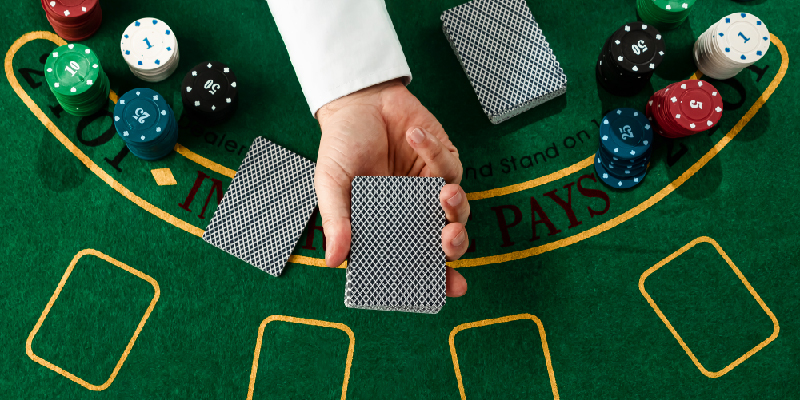Spanish Blackjack

Spanish 21 is just like regular blackjack with a few exceptions. Here are the different rules: THERE ARE NO 10's IN THE SHOE! This game is played with 6 decks containing 2-9, J, Q, K, A. Player 21 ALWAYS wins. Player Blackjack ALWAYS wins 3/2. You may double down once at any time. This happened due to a rise in popularity of games only involving 40 cards to play. The deck of Spanish suited playing cards has 4 suits, much like the 52-card decks most people are familiar with. The suits are cups, swords, coins, and batons. In the full 48 card deck, it has numerical cards ranging from 1-9 in these suits.
One of the most popular Blackjack variants, Spanish 21, has found its way to the online market, becoming a part of Microgaming's regular and Gold series blackjack editions. Played with eight decks without 10 denomination cards, the game offers an additional paytable with higher potential payouts on specific hand combinations.
Game Rules and Features
Spanish blackjack employs the hole card dealing rule, where the dealer can peek for blackjack after getting a face card or an Ace. In this version dealer hits on soft 17 and the player can split both the same denomination and equal value cards and play the double down move on regular hand or after a split. Players are granted with the Late Surrender option (unless the dealer has a blackjack hand) as well as with a Double Down Rescue move, which allows you to forfeit the round even after doubling the bet.
Bonus payouts come with certain combinations of same and mixed suits, such as five, six and seven cards with 21 totals or 6-7-8 and triple 7 hand combos.
Payouts & RTP
Regular paytable brings 1:1, 2:1 and 3:2 odds for standard, insurance and blackjack win. Bonus payout odds can be extremely high (50:1!) for triple 7 in the same suit with a same denomination upcard. For five cards with total 21, the player gets 3:2 payout; the same goes for mixed suit 6-7-8 or 7-7-7. Seven cards amounting to 21, triple 7 and 6-7-8 of spades are paid according to 3:1 ratio. With six 21 total cards and same suit 6-7-8 or triple 7, the player gets 2:1 bet turnover. Bets range from $1 to $1,000, with 99.51% return to player.
Recommended Tips
There are certain blackjack combinations that will always follow the same pattern of rules. For example, most players will stand on hard 18 hands, hit on 12 through 14 soft totals, split Aces and double on hard 11 without any exception. Every move will naturally be measured against the dealer's upcard. Sometimes you will want to take the risk and request an extra card on a slightly higher hand if it can lead to the dealer's bust.
Microgaming Spanish Blackjack Summary
When players are concerned, Microgaming version of Spanish Blackjack is definitely one of the releases that incorporates some of the most beneficial set of rules – late surrender, re-double and best of all, tied 21 totals and Blackjack hands in favour of the player! For a upgraded version of the game, make sure to also check out the Gold Version of Spanish Blackjack. The gold version offers better graphics and sound. The overall game play has been enhanced in many ways.
Spanish 21 is a blackjack variant owned by Masque Publishing Inc., a gaming publishing company based in Colorado. Unlicensed, but equivalent, versions may be called Spanish blackjack. In Australia and Malaysia, an unlicensed version of the game, with no dealer hole card and significant rule differences, is played in casinos under the name 'Pontoon'. It was first introduced about 1995.[1]

Rules[edit]
Spanish 21 is played on a blackjack table with a custom layout and uses the following rules:
- The game is played with six or eight decks dealt from a shoe, or from a continuous shuffling machine (CSM). Spanish 21 is played with 48-card Spanish decks, although standard French suited 52-card decks are used with the 4 ten-spot cards removed. All cards have the same values as in blackjack.
- The dealer gets a hole card.
- Like traditional blackjack, the dealer hits on 16 and stands on 17. In some venues, the dealer hits on a soft 17 (abbreviated as H17), though most venues have the dealer stand on soft 17 (S17). Hitting soft 17 (H17) negatively impacts the player; that rule increased the house edge by 0.40%.
- Blackjack (a natural total of 21 on the first two cards) always wins, and is always paid 3:2 regardless of whether or not the dealer has a blackjack.
- Insurance is paid 2:1, just like in blackjack, despite the fact that there are four fewer ten-valued cards per deck. As 3 cards in 12 are worth ten, the chance of the dealer getting a blackjack when showing an Ace is only 25%. Therefore, for insurance to be an even bet, it would have to pay 3:1, not 2:1. The house edge on the insurance is 24.7%, one of the worst of any wager in a casino.
- Hitting, standing, and splitting all follow similar rules to blackjack. Doubling after splitting (DAS) is always permitted, and, in most venues, players are allowed to draw as many cards as they wish after splitting aces, or may double down after receiving second or subsequent cards.
- Players can split to a maximum of four hands, even on aces.
- In most venues, if the dealer does not have blackjack, players may surrender, and get half their bet back in exchange for relinquishing the right to play on. This type of surrender is known as a 'late surrender' (LS).
- Players can surrender after doubling (sometimes called forfeit, double-down rescue, or concede). The dealer takes the original bet, and the player retains the double portion of the bet. This is because the player is allowed to double down for less than the original bet.
- Once the initial two-card hands are dealt, if the dealer is showing an Ace or face card, he peeks underneath the hole card to check for a blackjack, before playing actually commences. If he has blackjack, all players automatically lose, unless they also have a blackjack (which, as mentioned above, automatically win 3:2).
- The player may double down on any total and on any number of cards.
- In some casinos, players may double double down, or redouble up to two times after doubling down. For example: The player bets one unit and is dealt 2-3, giving a hand total of 5; the dealer is showing a 6. The player doubles the first time and draws a 3. The hand total is now 8 and the total amount wagered is two units. The player doubles a second time and draws a 3. The hand total is now 11 and the total amount wagered is four units. When the player doubles a third time on 11, the total amount wagered will be eight units. Redoubling is a profoundly player-advantageous rule, when optimally executed.
- A total of 21 always wins for the player. It never pushes against the dealer's 21.
- A five-card 21 pays 3:2, a six-card 21 pays 2:1, and a 21 with seven or more cards pays 3:1. A 21 composed of 6-7-8 or 7-7-7 of mixed suits pays 3:2, of the same suit pays 2:1, and of spades pays 3:1. These bonus payouts apply even if the hand was the result of a split. However, doubling down negates these bonuses.
- A 'super bonus' of $1000 for bets under $25, and $5000 for bets of $25 and over, is paid on a suited 7-7-7 against any dealer 7. All other players at the table receive a $50 'envy bonus'. Splitting or doubling down negates the 'super bonus'.

The removal of the four tens in each deck gives roughly a 2% advantage to the dealer. The liberal rules of Spanish 21, though, do compensate for this. With optimal play, the house edge of a Spanish 21 table is lower than that of a blackjack table with the same rules on hitting or standing on soft 17.
The game also offers an optional 'Match the Dealer' side bet, which compares a player's cards with the dealer's upcard. Matching the rank of the dealer's card pays 4:1 on a six-deck game, and 3:1 on an eight-deck game, while a 'perfect match' of rank and suit pays 9:1 on six decks and 12:1 on eight decks. A player may win on both cards; (e.g. if a player has 8s 8c and the dealer has 8c as an upcard, the player will receive 3:1 on the rank match and 12:1 on the perfect match, paying out a total of 15:1.) While this side bet has a house edge of approximately 3%, significantly higher than the edge of the main game, it is one of the lowest house edges of any blackjack side bet.
House edge[edit]
The following tables list the Spanish 21 house edges for all rule sets found in North America.[2] (The figures were obtained from 10-billion hand simulations and have a standard error of 0.001%. The super bonus is averaged out to a 100:1 payout.) These charts assume that the player is using basic strategy. 'H17' means that the dealer hits soft seventeen, 'S17' means that the dealer stands on soft seventeen.
How To Play Spanish 21 Card Game
| Rules | Decks | House Edge |
|---|---|---|
| H17 | 6 | 0.78% |
| 8 | 0.80% | |
| S17 | 6 | 0.37% |
| 8 | 0.38% | |
| H17 with redoubling | 6 | 0.42% |
| 8 | 0.45% |
| Rule Changes | Change in House Edge |
|---|---|
| No surrender (H17) | 0.018% |
| No surrender (S17) | 0.006% |
| No draws on split Aces (H17 or S17) | 0.28% |
| No draws on split Aces (H17 with redoubling) | 0.29% |
| Natural after split pays 3:2 | –0.16% |
Match the Dealer[edit]
How To Count Cards In Spanish 21
Match the Dealer is a side bet offered on most Spanish 21 games. The player wins the side bet if the rank of either or both of their initial two cards matches the rank of the dealer's up card. If the cards match in both rank and suit, the player wins a bigger payout. Some casinos offer a second Match the Dealer bet which wins when either or both of the player's initial two cards match the dealer's hole card. The payouts and the house edge vary depending on the number of decks in play as shown below.
| Number of Decks | Non-Suited Match | Double Non-Suited Match | Suited Match | Suited + Non-Suited Match | Double Suited Match | House Edge |
|---|---|---|---|---|---|---|
| 2 | 4:1 | 8:1 | 15:1 | 19:1 | NA | 3.63% |
| 4 | 4:1 | 8:1 | 10:1 | 14:1 | 20:1 | 3.20% |
| 5 | 3:1 | 6:1 | 13:1 | 16:1 | 26:1 | 3.53% |
| 6 | 4:1 | 8:1 | 9:1 | 13:1 | 18:1 | 3.06% |
| 8 | 3:1 | 6:1 | 12:1 | 15:1 | 24:1 | 2.99% |
References[edit]
- ^Dalton, Michael. 'S ... is for Shuffle - Blackjack Review Network'. Blackjack Review Network.
- ^Reproduced from The Pro's Guide to Spanish 21 and Australian Pontoon (Lulu Publishing, 2008), with permission from the author, Katarina Walker